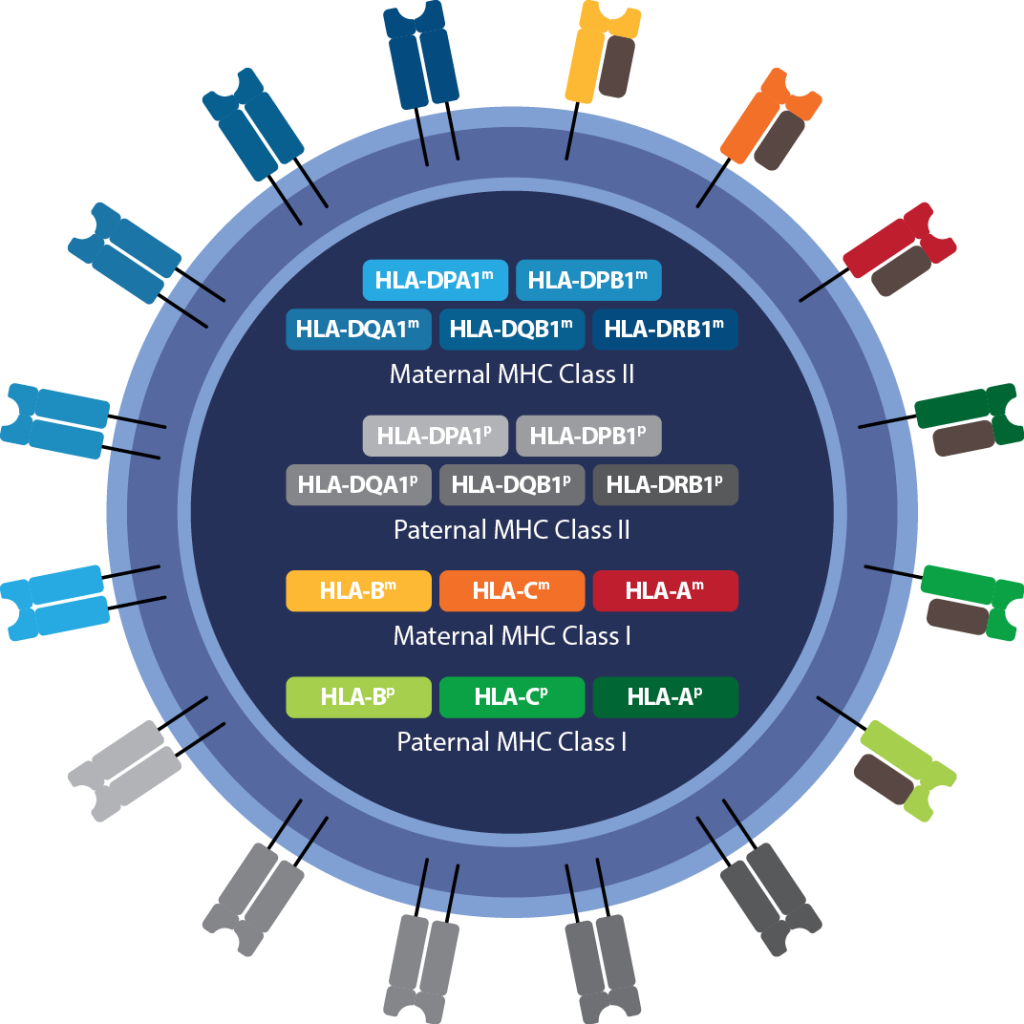Human Leukocyte Antigen
The Human Leukocyte Antigen system is largely responsible for regulating the immune system. Human Leukocyte Antigen (HLA) is a group of related proteins that are encoded by the major histocompatibility complex (MHC) genes in humans. These cell-surface proteins are responsible for the regulation of the immune system. The MHCs are characterized as Class I and Class II that differ by function and dimerization (binding) patterns. The proteins encoded by HLAs are those on the outer part of body cells that are unique to that person. The immune system uses the HLAs to differentiate self-cells and non-self-cells. Any cell displaying that person’s HLA type belongs to that person and, therefore, is not an invader.1
Human Leukocyte Antigen Genotype
HLAs have multiple roles in disease defense
- They may protect against or fail to protect against (if down-regulated by an infection) cancers.2 Cancer researchers are looking to see if there are any relationships between HLA variants and certain cancers.
- HLA genotypes may have an impact on drug response and prognosis. There is ongoing research exploring this relationship with cancer immunotherapy.3
- HLA cellular recognition tells the body what cells are self and what cells are invaders.4
- Mutations in HLA may be linked to autoimmune disease (examples: type I diabetes, Celiac disease).5 Medical researchers are examining the relationships between HLA variants and a variety of autoimmune diseases.
HLA Genotyping is included with all Caris orders and is performed using Whole Exome Sequencing. Understanding a patient’s complete profile through Caris molecular profiling not only provides the most comprehensive genomic profile that can help identify the best course of today’s treatment, but it can continue to enhance a provider’s clinical approach as evidence evolves. There is ongoing research that observed a correlation between patients’ HLA genotype with a response to checkpoint blockade immunotherapy. A patient’s genotype may also direct them to clinical trials recruiting for specific genotypes. Understanding patient HLA genotypes can be utilized in the development of both personalized cancer vaccine development as well as in the immunotherapy biomarker discovery.

- Reference, Genetics Home. “Histocompatibility complex”. Genetics Home Reference. Retrieved 1 May2020.
- Nobuoka D, Yoshikawa T, Fujiwara T, Nakatsura T. Peptide intra-tumor injection for cancer immunotherapy: enhancement of tumor cell antigenicity is a novel and attractive strategy. Human vaccines & immunotherapeutics. 2013;9:1234–1236. doi: 10.4161/hv.23990.
- Wang, C., Xiong, C., Hsu, Y., Wang, X., & Chen, L. (2020). Human leukocyte antigen (HLA) and cancer immunotherapy: HLA-dependent and -independent adoptive immunotherapies. Annals Of Blood, 5. doi:10.21037/aob-20-27
- Duquesnoy RJ. Histocompatibility testing in organ transplantation. University of Pittsburgh Medical Center Web site [http://tpis.upmc.edu/tpis/immuno/compre.htm];1996.
- Simmonds and S. C.L. Gough, “The HLA Region and Autoimmune Disease: Associations and Mechanisms of Action”, Current Genomics (2007) 8: 453. https://doi.org/10.2174/138920207783591690
Discover
More
Caris molecular profiling includes microsatellite instability (MSI) testing via next-generation sequencing (NGS).
Genomic Loss of Heterozygosity or genomic instability is often related to defective homologous recombination repair mechanisms.
Speak to an Expert
"*" indicates required fields
